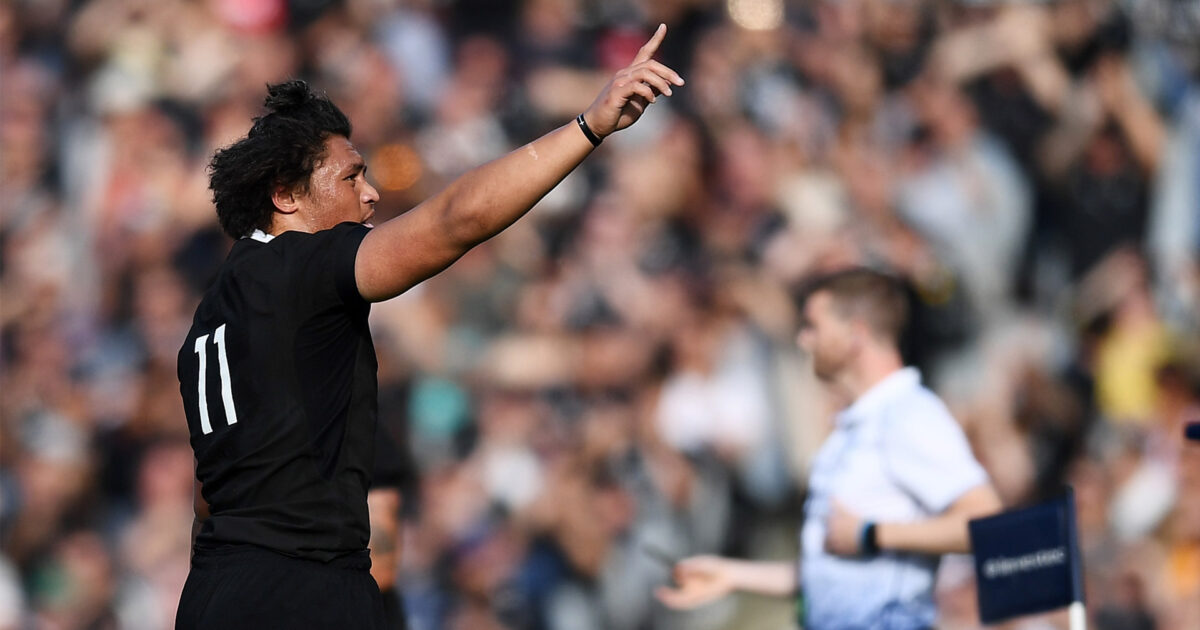Caleb Clarke the star as All Blacks bounce back with big win over Wallabies in Auckland

All Blacks 27
Wallabies 7
The All Blacks have taken a big step towards retaining the Bledisloe Cup with a victory over the Wallabies at their fortress Eden Park during which wing Caleb Clarke announced himself on the world stage.
The 27-7 victory will be seen as a redemption from last week’s mainly tepid performance in a 16-16 draw in Wellington but the Wallabies were just as obdurate and hard to shift here a week later until a blockbusting run from Clarke, who beat five defenders and set up Ardie Savea’s try, knocked the stuffing out of them.
It was the sort of run reminiscent of Jonah Lomu in his prime and the anticipation among the crowd was palpable every time the 21-year-old received the ball.
The charge which set up Savea’s try will feature in highlight reels for a long time and his proud father Eroni, a former Blues and All Blacks midfielder, could only smile and shrug his shoulders for the cameras while he sat and watched in the crowd of more than 45,000.
The Wallabies, desperate to respond, went extremely close via left wing Marika Koroibete, who was held up in the corner, and hooker Brandon Paenga-Amosa, whose try was ruled out for a double movement.
By then the damage was done. Sam Cane’s converted try after an excellent run from Patrick Tuipulotu meant there was no way back for Dave Rennie’s men, who will have to win the next two Bledisloe Cup tests in Brisbane and Sydney starting on October 31 to win a trophy they haven’t held in almost 20 years.
Clarke, in his first test start after impressing off the bench last weekend, received a standing ovation when he limped from the field in the 68th minute, star in the ascendent and presumably a fixture in the No 11 jersey for the foreseeable future.
All Blacks coach Ian Foster had got the response he had wanted in terms of physicality, and apart from a couple of wobbles his team’s set piece was superior.
But, while that scrum advantage and a run from Jack Goodhue, who went straight through James O’Connor, a carry which led to their first try from short range via Aaron Smith, put them on the front foot, the Wallabies were again conceding nothing.
The charge which set up Savea’s try will feature in highlight reels for a long time and his proud father Eroni, a former Blues and All Blacks midfielder, could only smile and shrug his shoulders for the cameras while he sat and watched in the crowd of more than 45,000.
The Wallabies, desperate to respond, went extremely close via left wing Marika Koroibete, who was held up in the corner, and hooker Brandon Paenga-Amosa, whose try was ruled out for a double movement.
By then the damage was done. Sam Cane’s converted try after an excellent run from Patrick Tuipulotu meant there was no way back for Dave Rennie’s men, who will have to win the next two Bledisloe Cup tests in Brisbane and Sydney starting on October 31 to win a trophy they haven’t held in almost 20 years.
Clarke, in his first test start after impressing off the bench last weekend, received a standing ovation when he limped from the field in the 68th minute, star in the ascendent and presumably a fixture in the No 11 jersey for the foreseeable future.
All Blacks coach Ian Foster had got the response he had wanted in terms of physicality, and apart from a couple of wobbles his team’s set piece was superior.
But, while that scrum advantage and a run from Jack Goodhue, who went straight through James O’Connor, a carry which led to their first try from short range via Aaron Smith, put them on the front foot, the Wallabies were again conceding nothing.
They were missing the injured Sam Whitelock and Rieko Ioane, while Hodgman and midfielder Peter Umaga-Jensen celebrated debuts. Blindside flanker Shannon Frizell played perhaps his best test and there were genuinely good impacts off the reserves bench from the returning Scott Barrett, halfback TJ Perenara, loose forward Hoskins Sotutu and Clarke’s replacement Damian McKenzie.
None is likely to be as pleased as young Caleb Clarke, however; a No11 on the move in a big way. His interventions were a big reason why the All Blacks retained their winning record at Eden Park which dates back to 1994, and why the Wallabies couldn’t beat a hoodoo which dates back to 1986.
“Just too excited I think,” said hooker Dane Coles to referee Angus Gardner after scrapping with Wallabies prop Taniela Tupou when the match was barely three minutes old.
As Foster reflects on his first win as head coach and Clarke on his magical hour and eight minutes in front of his friends and family, it’s a sentiment that will be shared by many All Blacks supporters who just witnessed a new global star.
All Blacks 27 (Aaron Smith, Jordie Barrett, Ardie Savea, Sam Cane tries; Richie Mo’unga pen, 2 cons)
Wallabies 7 (Marika Koroibete try; James O’Connor con)
Halftime: 10-7









































































